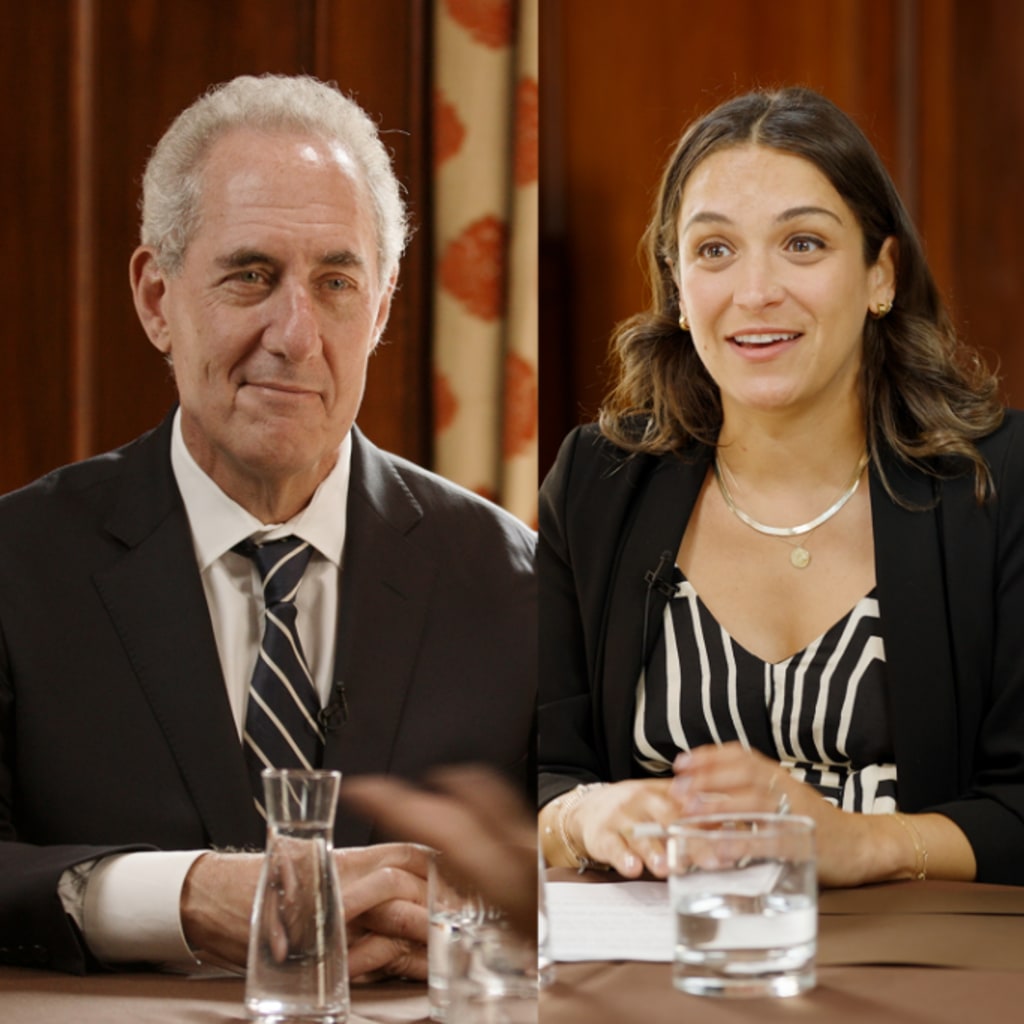Why We Need International Students
For decades, international students have enjoyed bipartisan support in the United States, with strong consensus that they fuel American innovation, job creation, and competitiveness. But in recent years, their access to U.S. colleges and universities has come under threat, and other nations are seizing the opportunity to bring in the world’s brightest students.
Published
Host
- Gabrielle SierraDirector, Podcasting
Guests
- Edward AldenSenior Fellow
- Esther BrimmerJames H. Binger Senior Fellow in Global Governance
Supervising Producer
- Asher RossLead Content Strategist
Audio Producer and Sound Designer
- Markus ZakariaAudio Producer & Sound Designer
Associate Podcast Producer
- Rafaela Siewert
Senior Producer
- Jeremy SherlickDirector of Video
Show Notes
In July, the Donald J. Trump administration enacted a new rule that would have forced international students to attend in-person classes amid the coronavirus pandemic, or face deportation. This led to a swift backlash from universities, educators, business leaders, and students. Though the rule was reversed, it follows a chain of actions that has sought to curb immigration to the United States.
This episode examines the profound value that international students offer to the United States, and what the country will lose if it cedes its role as the premier destination for a good education.
From CFR
“Huawei: China’s Controversial Tech Giant,” Lindsay Maizland and Andrew Chatzky
“How Are U.S. Colleges Dealing With Coronavirus?,” Anshu Siripurapu
“U.S. Temporary Foreign Worker Visa Programs,” Claire Felter
“Beset by Crises, Universities Must Reassert Their Values,” Foreign Affairs
Read More
“How International Students Are Changing U.S. Colleges,” Wall Street Journal
“Trump’s Anti-Immigration Crusade Is About to Strike at the Heart of the U.S. Economy,” Edward Alden, Foreign Policy
“New Data Shows Slowdown in Growth of International Students in the U.S.,” Foreign Policy
“The Immigrant-Unicorn Connection,” Wall Street Journal
“I’m the President of M.I.T. America Needs Foreign Students.,” New York Times
“Stranded International Students Are Sustaining U.S. College Towns,” Bloomberg Businessweek
Watch or Listen
“FBI Urges Universities To Monitor Some Chinese Students And Scholars In The U.S.,” All Things Considered
Transcript
We had been planning to do an episode on international students, visas and the education system for the past few months. It seems like an underreported topic that people should know about.
But then, it became part of the news.
CBS: 0:17 “Students whose schools plan to offer online-only classes in the fall will have to transfer or leave the country or face possible deportation.” https://www.youtube.com/watch?v=d36hCTgZsyY&t=6s
CTV: 0:00 “Several prestigious American universities are now suing the Trump Administration.” https://www.youtube.com/watch?v=DA1G4824QS8
MSNBC: 3:38 “The Trump Administration backed down, but I don’t think it’s the end for what we might see from the Administration.”https://www.youtube.com/watch?v=ArlB7m6jgek&feature=youtu.be
You could be forgiven for thinking that student visas are a classic partisan issue in American politics - liberals pushing for cultural diversity and a more open society while conservatives warn of dangers to national security and American jobs. But the real story is quite different. For decades Republicans and Democrats agreed that a steady pipeline of the world’s best minds into American universities is essential for our economy, innovation, and competitive advantage with the rest of the world. It was a system that largely worked.
The Trump administration has taken a different perspective, and the pipeline of international students into American businesses, hospitals, and research facilities has begun to constrict. As this happens, other nations have begun picking up the slack.
I’m Gabrielle Sierra, and this is Why It Matters. Today, international students, and American competitiveness, under threat.
SIERRA: Alright, so I’m a student in another country, why do I want to come to school in the United States?
Edward ALDEN: I mean, if you look at the lists of the world’s 100 best universities, more than half of those are in the United States. You know, if you come here and you graduate with a degree from a top American University that’s worth a tremendous amount throughout your life.
My name is Edward Alden. I’m a senior fellow at the Council on Foreign Relations. I’m also the Ross distinguished visiting professor at Western Washington University in Bellingham, Washington.
Alden is a leading voice on immigration, innovation, and US competitiveness. He spends a lot of time studying the contributions of immigrants to the US economy.
ALDEN: I mean, secondarily, even if you’re not coming to the best institutions, I mean, the United States has a global reputation as a dynamic, innovative place and if you’re a talented ambitious foreign student, it’s a place you want to be. I mean, finally education is an English and English remains the universal language of business. So, you know, to the extent that you come out from an American education with a strong grasp of the English language, that’s something also going to be very helpful in your life.
Esther BRIMMER: There are liberal arts colleges, there are research institutions, institutions large and small that can cater to many different types of learning and covering many different styles.
My name is Esther Brimmer. I’m Executive Director and CEO of NAFSA, the Association of International Educators.
So bright students around the world know they can come here and get a great education. And perhaps one of the most exciting things is the dynamism of the American classroom. That is very rare, that idea of having an interactive classroom where students and professors are talking to each other, where the learning is shared, it’s not just the professor lecturing. And I’ll tell you as someone who was a former professor, I love that environment. And indeed, it’s something where we even put out a publication on introduction to the American classroom to help students get used to the idea that they will have to defend their ideas.
SIERRA: Ok, so you decide you want to come to school in the U.S. How does the system actually work? What are the options for getting a visa?
ALDEN: Well, you need to be admitted to the university that you wish to attend. So that’s the same thing an American student would face. You have to apply to the university and write your admissions essay, all the things that American students do when they want to attend a university. If you are admitted, then you need to apply for what’s called an f1 student visa, the visa does not allow you to remain in the United States permanently, does not allow you to work for income with some exceptions while you’re in the United States. It’s a temporary visa that permits you to come here and study.
Alongside the F-1, there are also J1 visas, and a few other lesser-known options. Together they account for roughly 1.1 million foreign students in the US.
For anyone who has done it or helped someone do it, you know that applying to college is not easy. Even with some assistance from family or a guidance counselor. For an international student, it also means traveling to an embassy or consulate in their home country, and going through a meticulous and costly process to get a visa. And it isn’t as though they get to breathe a sigh of relief once they are accepted, or even after they arrive.
BRIMMER: For many students, it may be their first time out of their home country. Maybe their family has all saved up their money to send their bright child to the US. That’s a big commitment by the child of the family. When they get to the United States, their institutions, of course, comply with the law. And some people may not realize, but every international student is actually, in effect, tracked by its institution. In other words, there is an official at each institution that has to know where that student is, and be able to file documentation on them. So unlike any other visitor to the United States, business travelers, tourists, only international students are actually recorded and tracked with that level of detail. So the student has a lot of obligations, a lot of costs, and their institutions have additional obligations as well. It’s a big commitment, a very big commitment, but it’s a life-changing commitment.
Katie Tracy: 0:00 “It’s funny how wide eyed I was when I first came to study in America. I dreamed about so many things, the freedom, the opportunities. ” https://www.youtube.com/watch?v=FqYJC4lqwSY
Lingua Marina: 4:34 “America, I think, is one of the best countries in terms of having great people teach students.” https://www.youtube.com/watch?v=SQa3FKAgwI4
NBC: 2:00 “The cultural exchange that you get in the U.S., you don’t get it anywhere else in the world.” https://www.youtube.com/watch?v=tCrNOJVpag4&feature=youtu.be&t=117
Education USA: 1:05 “After studying here, you can go anywhere and do whatever you want to do. ” https://youtu.be/ygAaG_Qipo8?t=60
SIERRA: Okay, so you’re here for let’s say the two or four potentially, I guess, eight years. You know, what happens once you graduate?
ALDEN: You can say ‘thank you very much, United States. I’ve enjoyed my time in my education here and you can go back to your home country. And that’s what a lot of foreign students do. If you want to stay and work for a US company, the only real option is what they call the H1-B Visa Program, which allows US companies to hire foreign citizens who have at least a bachelor’s degree. That program is quota capped at 65,000 per year and there’s always more demand than there is supply but they’re an extra 20,000 spots for foreign students graduating with advanced degrees from American universities. So particularly if you’re working in, you know, engineering or technical or scientific fields, there’s a reasonably good chance that you can find an American company that will want to bring you on under an H1-B visa.
The H1-B visa is a crucial part of the international student pipeline - it’s what allows them to remain in the U.S. and join the workforce. Many of these students go on to become citizens, found companies, and create jobs.
ALDEN: You could make a pretty strong argument that foreign students are at the heart of US success as-as the most innovative economy in the world. I mean, they have brought tremendous benefits. Maybe you fill in the history a bit. Basically, going back to the 1950s, the United States began to encourage foreign students to come here. And a lot of that was essentially a diplomatic initiative. We wanted to build up friends around the world. I mean, it’s the same reason the Fulbright program was created to send American students and faculty abroad. We thought that if foreign students came here, and they studied in the United States, they got to see what life in the United States was like that that would bring benefits down the road when these people went back home, they would look favorably upon the United States.
I mean, there are dozens of foreign leaders who were educated at universities in the United States. Former Secretary of State Colin Powell used to say that these educational exchanges were the best diplomatic program the United States had, that it did more than anything else to win us friends around the world.
When international students go home, they bring American soft power back with them. And that’s because they’ve had the chance to see the U.S. with their own eyes, in all its contradictions and diversity of values. Not just what’s seen on the news in their home countries.
Many of them, however, choose to stay. And when they do, they often turn out to be innovators.
ALDEN: So the second big benefit to the United States comes from the foreign students who study here and then decide to stay and make their careers in the United States. And the number of those has been growing substantially, particularly in the so-called STEM fields, you know, science, technology, engineering and math, that are so important to American innovation. You go back to the late 80s US universities were graduating about 25,000 foreign students in the STEM fields. Today, it’s close to 125,000. And the overwhelming majority of those students remain and make their careers here in the United States. The retention rate is about 75%. And it’s higher than that, importantly, for Chinese and Indian students who are by far the two largest cohorts of foreign students, especially in the STEM fields, the retention rate there for Chinese is about 90%. And it’s pretty close for Indians. And you know, if you look, for instance, at the history of Silicon Valley, almost half of Silicon Valley companies had at least one foreign citizen as their founders. And most of them went to American universities.
BRIMMER: It is really fascinating to look at the so-called ‘unicorn companies,’ the startups that are now valued at over $1 billion, that a quarter of them were founded by international students, people who came here to study and then eventually were able to create businesses. They’ve directly contributed to the wealth of the United States and the well being of the United States.
The data is conclusive about international students creating jobs. Sometimes this happens on a small scale, other times you can get someone like Elon Musk, who founded PayPal, Tesla, and SpaceX after studying in the U.S. A lesser-known but no less important name is Noubar Afeyan, an international student of biochemical engineering at MIT, who went on to found 38 companies in his career. One of those companies, Moderna, helped develop the first COVID vaccine to be tested in humans.
And even before they graduate, international students make an enormous economic contribution through tuition.
BRIMMER: In addition to the important intellectual benefits, there are significant economic benefits to having international students and scholars in the United States. According to our most recent study, international students and scholars contribute $41 billion to the United States economy. They account for over 458,000 jobs. And those contributions are spread across the country. After all, many international students pay full fare, that means that they in effect are helping finance the American students sitting next to them in the classroom. It’s a real contribution and a real benefit to the United States.
Seems like a sweetheart deal for the U.S, and yet for years we’ve been losing our edge in attracting the best international students. At the same time, attitudes toward them have been growing more hostile. We’ll dive into all that and more after a quick break.
So in July, as the US was grappling with the COVID pandemic, another topic began making headlines. The Trump administration announced a plan that would upend the lives of international students studying in the US.
ALDEN: The original regulation said unless you’re taking an in person class, you’re going to have to return to your countries because you know, you can do online from India as well as you can do it from the United States, I mean, forgetting that, you know, that’s on the opposite side of the world, and so you’d be taking classes in the middle of the night.
BRIMMER: We saw major universities file legal cases to have this proposal stopped. And what was amazing to see was the outpouring of support. You saw all sorts of different types of business groups. You saw educational groups, you saw social groups. You saw religious groups. You saw communities and institutions and people, international students and scholars and their American counterparts, students and scholars saying, ‘we want to have international students here, we want to be sure that they’re welcome. We want to be sure that even if their courses go online, that they won’t fall out of status’. And it was remarkable in such a short period of time to see that kind of swelling up of support for international students and scholars.
CBS: 0:40 “The announcement by ICE fueled strong criticism from students, colleges, universities and lawmakers, including some republicans typically aligned with the White House.” https://youtu.be/JCS6Hv3SaU4?t=39
MSNBC: 2:03 “What we’re simply saying to the Administration is ‘Stop.’” https://www.youtube.com/watch?v=-PWXTOcJX7s&t=21s
Democracy Now: 5:02“It’s not the foreign students’ faults, and to be honest, they are one of the most valuable assets that this country has.” https://www.youtube.com/watch?v=IEQA_oAnW6M
MSNBC: 2:40 “It’s not time to shun those who have excelled in their fields simply because they are not American born.” https://www.youtube.com/watch?v=zNmfQId1IyY&feature=youtu.be&t=160
ALDEN: I mean, I think some of that is this recognition of the broad value that foreign students have to the United States. But I think it also kind of galvanized this awareness that we really haven’t been treating foreign students very well, in some ways for a couple of decades, but particularly in the last few years. They really are taken for granted. I think their contributions to the United States are poorly understood. And so I think this action really did bring a pretty strong, coordinated response. I mean, it was noteworthy that the administration, largely, though not completely, backed down on the eve of the hearing for a lawsuit that was spearheaded by Harvard and MIT. And I think it’s pretty clear the judge would have slapped the administration down for this order. And so the administration largely though I say, not completely, reversed course.
So in the revised rule, those students will be able to stay. But new foreign students, those who are getting visas for programs starting this fall, unless they have at least one face-to-face class, they’re not going to be admitted to the country. And so there are going to be a lot of foreign students who were hoping to attend in the fall of 2020 who are not going to be allowed to attend under this new rule. So there’s going to be a significant decline in new foreign students as a consequence of that rule. And at the moment, it doesn’t look like the universities are going to challenge this, they’re going to live with a compromise.
This decline could affect the entire pipeline - fewer students beginning their studies could mean fewer students moving on to Silicon Valley, fewer starting businesses that could employ Americans during a recession.
And while the July action and the backlash against it were dramatic, it’s important to realize that the changes didn’t start there.
BRIMMER: So even before the pandemic, there had been nearly an 11% decline in the number of new students coming to the United States. The travel bans instituted early in 2017 and then the related issues to that have sent a message to some international students and scholars that they’re not welcome in the United States and that’s been a real concern. That sends a message, not only to those from specific countries cited in the executive order, but to all students. [They] began to wonder ‘if this country’s on the list, could my country be next? Would that mean that maybe I can’t get a visa?’
As U.S. policy becomes more severe, places like Canada, the UK, New Zealand and Australia have gained a competitive edge. In 2018 and 2019, as the pipeline was constricting in the U.S., Canada saw double-digit growth in its international students. It’s already starting to reap the benefits in terms of job creation, university income, and innovation.
ALDEN: The situation seemed pretty stable when President Trump came to office in 2017. Under the Trump administration, there has been quite a sharp turn of direction. The-the administration has a different view about foreign students than you know, what has been the strong consensus here for decades. Their belief is, first, that foreign students are taking positions in the universities away from American students. If a foreign student’s being admitted, that’s an American student who doesn’t have a seat at the institution. Therefore that’s a negative for Americans. Also quite a strong conviction in the administration that when foreign students remain and go to work for US companies, they’re also taking jobs away from American citizens. So the administration has been doing a number of things to try to discourage foreign students. The student visa process has become longer and more onerous. There’ll be limited work opportunities for foreign students after they graduate. Administration has been curtailing in various ways the H1-B program, which is so important for foreign students who want to stay and work.
As the Trump administration rolls back options for international students to study and work in the US, misinformation about them has been spreading. Sometimes answers to even the most basic questions are hard to find. So, we asked Edward Alden to field four of the most common ones.
SIERRA: Are foreign students taking up slots at schools that would otherwise go to American students?
ALDEN: Sometimes. The research suggests that at the elite institutions, probably yes. You know, if you’re at a Stanford where the acceptance rate is, I don’t know 6% or 3%, or whatever, there’s no question, sometimes foreign students are getting places that are not going to American students. On the whole, the research suggests that the more foreign students we have in the United States, the more places in total there are for Americans. They may be at other institutions, but the economic benefits from foreign students make the universities stronger, they’re able to expand, and therefore there are more places in total.
SIERRA: Hmm. So the pie gets bigger as opposed to just you know, getting devoured with none left.
ALDEN: The pie on the whole gets bigger, but you know, Stanford and Harvard and Yale don’t get any bigger.
SIERRA: Okay. After students graduate, are they stealing American jobs?
ALDEN: Again, mostly, no. I mean, the evidence is that foreign students because of the companies they start after they go to work are creating a lot more jobs than they’re taking away. In some places, yeah, definitely. I mean, sometimes, you know, a foreign student gets hired where an American doesn’t. But in the aggregate, far more jobs created for Americans, by the activities of these students when they stay, then jobs that are somehow taken away from Americans. So there too the pie is getting bigger.
SIERRA: Are spies from authoritarian countries like China posing as foreign students in order to steal sensitive information or technology that could then be misused?
ALDEN: This is a complicated one, right? Because, you know, Chinese students are the single largest cohort of foreign students in the United States. But you also have this growing economic, technological and military rivalry between the United States and China. And there’s absolutely no question that the Chinese have sent over researchers, that there are Chinese students who are acting effectively as, as, as spies here in the United States trying to glean secrets from companies, trying to recruit people in the United States, to spy on the United States, trying to use every tool they have to gain an advantage in the competition between China and the United States. So there is absolutely a need for targeted interventions to try to identify these security concerns. Arrest people where appropriate. Make sure that American Universities are aware of this threat. But there’s a big difference between that sort of targeted response and the kind of blanket actions the administration is considering. It’s been talking about, you know, an across the board ban on Chinese students who are working in science and technology fields, and that would just be tremendously costly to the United States and an absolute shot in the foot. So, yes, Chinese espionage is a real concern. No, the solution is not to bar Chinese students from coming to the United States, that would be an action whose consequences are far worse than the problem.
SIERRA: So what about the students who come here, get a good American education and then take those skills home? Do you think that’s hurting the United States?
ALDEN: I mean, by and large, no. Again, the research here is pretty clear. I mean, if they go back and work in companies, you can see actually far closer relations between companies headed by foreign students who studied in the United States and the United States. They’re inclined to, you know, buy components from the United States, to export products to the United States, to engage in trade with the United States. I mean, the only potential area of concern, getting back to the previous question is if they’re learning things that may be useful to foreign militaries, or other things that could somehow be used against the United States. But to some extent, it’s sort of a fool’s game to try to control that kind of knowledge. I mean, in the modern world, information, ideas, knowledge flow, very, very freely.
SIERRA: So how do you think the student visa issue has intersected with overall immigration policy under the Trump administration?
ALDEN: Yeah, this is a really interesting question because it marks the biggest difference between the Trump administration and previous administrations, both Republican and Democratic. The immigration debate in the United States for about three decades now has been largely about legal versus illegal immigration. And there’s been a strong consensus in both parties that legal immigration is an enormous net benefit for the United States. It’s a good thing. We want people coming here legally, we want them to move to the United States. We want them to contribute to our economy and our society. The problem is illegal immigration, and that was, you know, strong consensus kind of from the mid-1990s. And so most of what Congress tried to do, mostly failed to do but tried to do, was come up with reforms that would be generous on the legal immigration side, but would do more to crackdown on illegal immigration.
The Trump administration has a different view of the world, they think immigration generally is not a good thing for the United States. And so where this intersects with the student visa discussion is, you know, if you’re in favor of legal immigration, you’re inclined to see these foreign students as kind of the cream of the crop, right? These are the most highly educated people coming from around the world. They’re advancing their education at our excellent institutions, and these are going to be the legal immigrants who are going to make the largest contributions to the economy. And so you had in both parties generally a lot of enthusiasm for the program. Under the Trump administration, it’s much more ‘No, these foreign students are unwanted competition for Americans.’ And particularly as a result of Coronavirus, which has, of course has done so much damage to the economy and pushed unemployment well up into the double digits, the administration is using that as a rationale for saying, ‘Well, now in particular, we really need to keep immigrants out and we need to save the jobs that are being created for Americans’. So the administration has used the pandemic as a pretext for further cutting back on legal immigration. I mean most people haven’t really noticed this because it’s happened through a whole series of actions, but legal immigration to the United States is about half of what it was four years ago. So students are not the only group being affected by this at all.
BRIMMER: Several years of policies that projected an anti-foreigner message take their toll. The rise in xenophobia takes its toll. If there continue to be policies that come out that threaten their ability to comply with the status or create such ambiguity that they don’t know whether they’ll be able to study that will send a message to the world that the US does not want to have international students. And that’s not the case. People on campuses do want to have international students. But if they see national policies that say the opposite it makes it very, very hard for educators to welcome the students the way they would like to.
ALDEN: The US is losing the status it had as unquestionably the number one destination of choice for foreign students. All of the political and immigration and visa hassles that have been exacerbated by this administration are sending a very clear message to foreign students that, you know, if you want to go to the United States, you want to stay there, it’s going to be a very difficult journey. So why not look for easier options in other places?
SIERRA: So, do you think that we can recover our reputation? Or is the damage already done?
ALDEN: That is a fabulous question. And you know, I’m going to give an annoying ‘I don’t know.’ If you look at them at the modern history of this, the resilience of the United States is pretty extraordinary. I mean, we did you know, we did a lot of fairly unpleasant things to foreign students after 9/11. There were some damaging things that were done because of our fear in the immediate aftermath of the attacks. But you had the Bush administration at the time, which very much believed foreign students were good for the United States trying to fix those errors and put out the welcome mat again. You know, I don’t want to get particularly partisan here, but if President Trump is reelected, then I think you’re going to see that as a vindication for his protectionist policies on immigration and trade in other areas. And I think then we will really see a generation’s worth of damage in terms of foreign students coming. If there’s a different outcome, I think I think the US can still recover its ground here.
You know, you hinted at this at the outset, in one of your questions. I mean, I’ve mostly been talking about sort of hard stuff like economic performance and, you know, the high politics of diplomacy. But obviously, there are just tremendous benefits to the mixing of young people from other places, you know, I mean, this is why we have a Peace Corps program. This is why, you know, you have the Fulbright scholarships to send US students abroad, and it’s one of the big reasons we want to bring foreign students here. You know, we want our young people to get to know people from other cultures, to get to know people that speak different languages, to be exposed to different ways of looking at the world, to make friends from other backgrounds and other cultures. And it’s hard to quantify the benefits from that but I think it’s pretty obviously a good thing. And I think that’s something we really want to continue to encourage as a country and nurture and I hope we are not going to keep going in the wrong direction.
Want to learn more about the future for international students? Head to CFR.org/WhyItMatters for the show notes from this episode.
Interested in saying ‘hey’ to the Why It Matters team? You can always reach out on email at [email protected].
If you are a fan, subscribe to the show on Apple Podcasts, Spotify, Stitcher, or wherever you get your audio. And if you like what you hear, leave us a review!
Why It Matters is a production of the Council on Foreign Relations. The show is created and produced by Jeremy Sherlick, Asher Ross, and me, Gabrielle Sierra. Our sound designer is Markus Zakaria and our summer intern is Wynne Dieffenbach. Robert McMahon is our Managing Editor, and Doug Halsey is our Chief Digital Officer. Sarah Shaw gave us extra help with this episode, and we are very, very grateful.
Original music is composed by Ceiri Torjussen. Special thanks go to Richard Haass and Jeff Reinke.
For Why It Matters, this is Gabrielle Sierra, signing off. See you soon!






